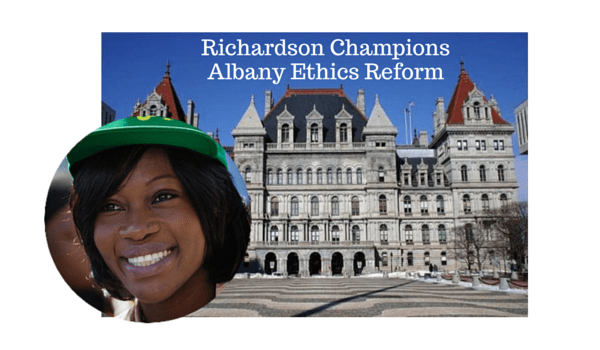Assemblywoman Diana C. Richardson (Crown Heights, Lefferts Gardens) lauded the Assembly Majority passage of an ethics reform proposal yesterday in order to strengthen government trust and increase transparency.
This initiative will look to limit the influence of special interests (A.9535), and comes as corruption continues to disrupt both branches of the legislature, and after the Assembly has already created a Office of Ethics and Compliance, increased disclosure requirements and stronger anti-bribery laws to hold corrupt public officials accountable.

“There have been countless disappointments for New Yorker’s, when it comes trusting our government officials. It’s important that residents have trust in their government and know it’s truly working for the people,” said Richardson. “Through this plan, we hope to increase transparency, reduce conflicts of interest and get real results for the people of New York State.”
Although, pension reform is not part of the current proposal, Richardson said she remains committed to reaching an agreement for a constitutional amendment which would strip corrupt officials of their pensions. “Why should taxpayers foot a bill to pay for pensions of officials that have mislead them and abandoned their trust?” she said.
The measure passed yesterday also included a provision barring legislators from receiving outside income unless it is directly related to work actually performed and also reasonable and proportional to the services rendered. Furthermore, elected officials who work as lawyers will be unable to receive referral fees for simply recommending a lawyer. In this regard, the splitting of fees must be proportional to the services performed by each individual.
There are a few exceptions with this proposal. Exemptions that are not defined as outside income include, but are not limited to, state or military salary, workers’ compensation, Social Security and similar government benefits, inheritances, investment income, lottery winnings, alimony and child support.
To further increase accountability in government, the proposal would limit outside income for legislators to 40 percent of the annual salary of state Supreme Court justices, or $77,200.
The overall provision also puts some reforms in campaign finance laws, such as curtailing LLCs current ability to skirt and make multiple contributions. The Assembly’s proposal would subject LLCs to the same $5,000 aggregate contribution limit that currently exists for corporations.
“For too long, the limited liability company (LLC) loophole for campaign contributions and other outdated campaign finance laws have allowed special interests to drown out the voices of ordinary voters,” said Richardson. “We want to make sure that the issues that matter to our families are heard and addressed.”










